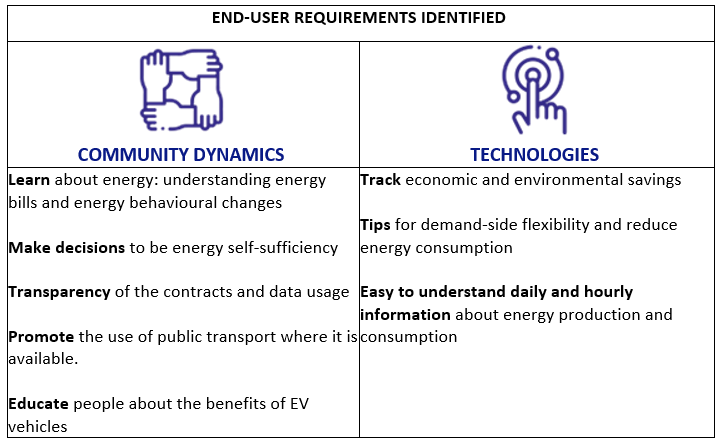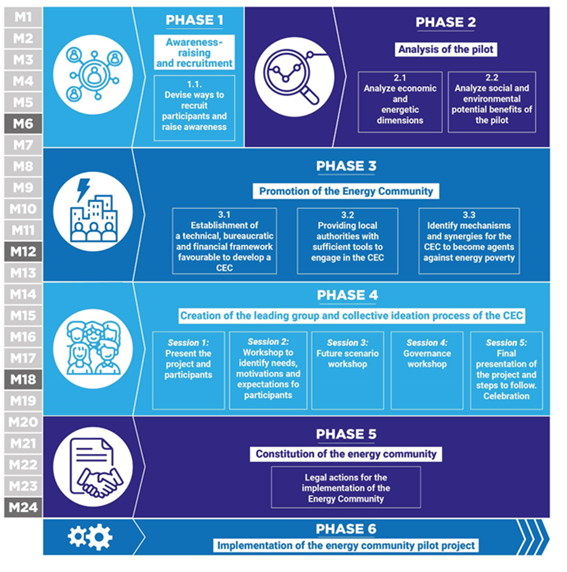Implementation and deployment of Citizen Energy Communities tends to pay less attention to end-user needs, behaviours, motivations requirements, and interests. Within the NEON project, Social Sciences and Humanities methodologies are being tested to systematize social innovation actions to guarantee the people’s ownership of Energy Communities. A two-fold approach is proposed: the study of behaviours and inner drives of the existing or potential end-users of the communities, and principles and stages that orient engagement strategies. This state-of-the-art approach will be implemented in the four case studies of NEON, during the lifetime of the project.
Services matching end-user requirements
To match the services of the Citizen Energy Community with the end-user requirements, the latter have been revealed through in-depth questionnaires. Within the NEON project, Energy Communities are of different typologies and therefore have end-users of diverse nature; in the municipality of Berchidda (Italy), citizens, cork and wine enterprises, and public bodies will conform the community; in Villacañas (Spain), enterprises of the industrial park Polígono las Cabezas and residents of the neighbourhood; the residential resort Domaine de la Source (France) will count with residents; and the real estate complex for offices, Stain City (France) will be used by workers. The questionnaire was designed for existing or potential residents, workers, public authorities, and enterprises as end-users of the Energy Communities, to reveal their energy-related behaviours, practices, and awareness. To do so, the following aspects were surveyed:
- User types: Users are analysed regarding their gender, age or the type of legal or fiscal entity they conform such as residential or industrial.
- Energy-related behaviour: Aspects related to the participants use of appliances or relation with the buildings (insulation, whether there are attachments, electrical equipment installed in the systems, etc.).
- Energy practices: Degree of active action in terms of energy through aspects such as the existing knowledge of the electricity tariff, the use of intelligent systems such as smart metres, etc.
- Interest in energy: Analysis of the interest that energy arouses in the members of the communities such as climate change, environmental topics or renewable energies.
More than 50 questionnaires answers were collected from the four Energy Communities, leading to the identification of key driving end-user requirements as follows:

Strategies to promote engagement
Rooted on the sociocultural diagnosis of end-users with respects to energy, a guiding and systematised strategy for the engagement of the end-users has been created. Engagement strategies are crucial to involve stakeholders, providing them with the necessary information, spaces, and tools to lead the co-design and successful uptake of the community. The democratisation of energy revolves around providing end-users of energy and other local actors what they need to make energy-related decisions along the value chain and lead the path towards a clean and just energy transition. This entails a cultural change that implies giving more importance to energy, and empowering women, people from lower classes, migrants, people living in poverty or with a disability, to get involved in efficient renewable energy production and consumption. The consolidation of a community takes time, meetings between people, coordination of participants and the creation of bonds.
To this end, an six key phases have been defined to: (1) identify channels and tools for raising awareness and attracting participants; (2) analyse the economic, social and environmental dimensions of Energy Communities through interviews or exploratory workshops with stakeholders; (3) promote the Citizen Energy Community including the legal, organisational and inclusion mechanisms; (4) put in place co-creative participatory workshops among end-users; and (5 & 6) define the constitution and implementation of the Citizen Energy Community.

All in all, the implementation of methods, strategies and innovation from Social Sciences and Humanities has revealed crucial information and paved the way for a sociocultural shift in the Energy Communities. The study and one-of-a-kind engagement strategy will be the baseline for a successful end-user empowerment.
Authors: Paula Jiménez, Gonzalo Navarrete, (Traza Territorio)